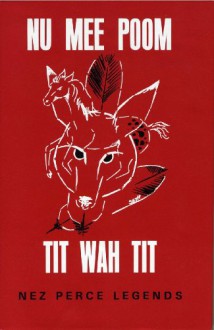For the Nez Perce, a legend was more than just an hour’s entertainment. Behind the adventures and trials of different heroes and villains important lessons were always to be found, because these legends were the first formal education a Nez Perce child received. By hearing these adventures again...
show more
For the Nez Perce, a legend was more than just an hour’s entertainment. Behind the adventures and trials of different heroes and villains important lessons were always to be found, because these legends were the first formal education a Nez Perce child received. By hearing these adventures again and again, the child gathered a great deal of practical information about his own physical surroundings. For example, the story, “Skunk Goes Looking For His Scent,” mentions the names of twenty-two plants and tells whether they taste sweet or bitter. “Tsikh-tsikh-itsim-Boy” tells us that good arrows may be made from serviceberry twigs that are dried by the fire. Many legends name and describe various aspects of the geography of the Nez Perce’s home territory and neighboring regions. A child also learned to identify the markings and characteristic behavior of raccoon, chipmunk, rattlesnake, and suckerfish by hearing such tales as “Sucker and Whitefish,” “Furred and Feathered Animals Have a Council,” and others.
Perhaps the most important lessons to be found in these tales, however, are of a moral nature. To help a child become a good Nez Perce was the main goal of his education. The legends began to teach him at an early age that his behavior whether good or bad, had a predictable outcome. Therefore, the stories implied that if one wanted to be happy and successful, there are things that he should and should not do. Although each story has its own special points, several major themes can be detected in the group of legends as a whole.
-No matter how hard you try to gain by cheating and deception, everything will go wrong and you will be left with nothing in the end.
-If a child is mean to others or disobedient to his parents, his friends will leave him all alone in the world. He will be unwanted and become a lonely child.
-If a person is greedy for more than his share, he is apt to lose everything. He should learn to share with others.
-Jealousy of a friend’s good fortune can lead to a bad end. We should give encouragement instead of ridicule.
-Even the strongest beings can be defeated by weaker but more intelligent beings.
-One should not judge another, or marry another by his looks alone. Too often we are quick to judge, not realizing what is in a person’s heart.
-The strong should learn to protect the freedom of the weak.
-People will help you if they believe you are sincere and have good intentions.
One can appreciate the wisdom of making such ideas a child’s first lesson.
The legends traditionally were told during the winter season. When a child would ask for a story during the summer he was told it was prohibited, or that a snake might come and “visit” his home if he insisted on hearing them during the season when food was being gathered and stored for the winter. When stories were told, the grandmother or mother would always give out “snacks,” such as dried meat, khouse (edible root), uppa (bread made of root and dried into bricks), or the keh-mes (camas bulb). Recounting the legends in this way was a primary means of educating the child. It was generally followed by the more advanced lessons of the wey-a-kin initiation in which a young man or woman was isolated and required to fast on top a high mountain in order to seek a vision which would guide them through life.
show less

